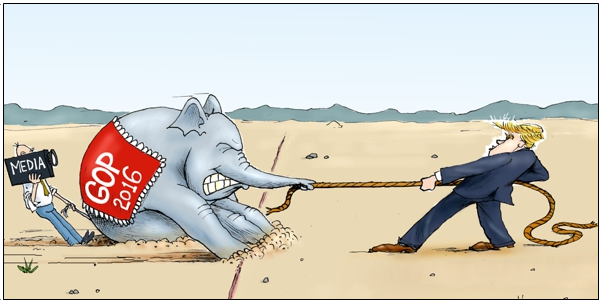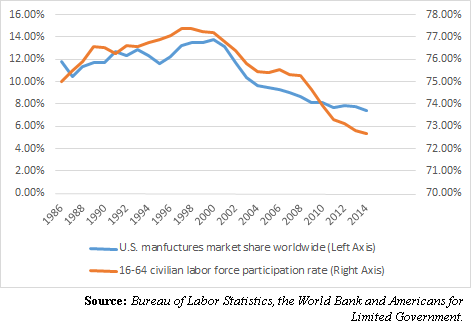It is fair to say that Donald Trump is picking up right where Ross Perot and Pat Buchanan left off in 1992 and 1996.
Running against the twin issues of bad trade deals and illegal immigration, Trump has broken the mold of recent Republican orthodoxy — which has favored new trade agreements and a path to legal status for millions who came here illegally.
Most recently in South Carolina, Trump won among voters who said immigration (51 percent) and the economy and jobs (36 percent) were their most important issues according to a CNN exit poll. And he won among those who said they felt betrayed by Republican politicians (36 percent).
Given that success, including winning the South Carolina Primary handily — where Trump went up and down the state campaigning heavily particularly on trade and proposing tariffs against countries like Mexico and China — it is worth analyzing how the U.S. economy has transformed in the past 30 years, and how that may be impacting Trump’s run for the White House.
The crux of Trump’s argument is that the trade agreements and illegal immigration are taking away the jobs of American workers. Well, in South Carolina alone, more than 111,000 manufacturing jobs have been lost since 1994, according to data compiled by the Bureau of Labor Statistics, a devastating 32 percent decline.
Nationally, that number breaks out to about 4.89 million manufacturing jobs lost, most of which were lost after 2000, about when China was granted permanent normal trade relations.
Since that time, the U.S. has been losing labor participation among 16 to 64 year olds, those in their prime working years, which has declined from more than a 77 percent rate at the turn of the century to just 72.6 percent in 2015, accounting for more than 10 million who either left the labor force or never entered on a net basis since then.
So was it job outsourcing?
Consider, the U.S. market share of manufactures exports worldwide — that is, U.S. exported manufactures as a percent of worldwide exported manufactures — peaked in 1999 at 13.48 percent, and has been declining ever since, according to data compiled by the World Bank. In 2014, it was down to 7.45 percent.
Going back 30 years shows that as U.S. market share of manufacturing rose worldwide in the late 1980s and 1990s, so too did labor participation. And that once we were losing market share, labor participation followed closely behind.
Perhaps this is what Ross Perot meant in the 1992 presidential debate when he famously said, “We have got to stop sending jobs overseas. It’s pretty simple: If you’re paying $12, $13, $14 an hour for factory workers and you can move your factory South of the border, pay a dollar an hour for labor… have no health care — that’s the most expensive single element in making a car — have no environmental controls, no pollution controls and no retirement, and you don’t care about anything but making money, there will be a giant sucking sound going south.”
So, whatever the supposed virtues of globalization — lower prices of goods and services or more economic growth — there is a definite cost that must also be considered, and that is the ability to employ American workers.
Adding to the malaise is the higher cost of doing business in the U.S. brought on by greater taxes, more regulations and, more generally, just higher property and labor costs.
Taken together, it is this failure to compete globally that tells the story of the America’s labor force decline.
Globalization — in this case as represented by the declining U.S. global market share in manufacturing — has a direct bearing on whether people in the U.S. will have jobs or not. Or whether they will become dependents of the government or their families.
It is proof positive that making stuff in the U.S. matters. A lot. Not just from the standpoint of employing people in factories, but in terms of keeping capital and investment in the country, which has reciprocal benefits throughout the domestic economy and unquestionably creates jobs. It shows running balance of payments deficits and shifting production overseas necessarily moves those jobs. That is the price.
If nothing else, it may help to explain what in part is propelling Donald Trump’s ascendancy as the Republican presidential frontrunner. The jobs issue — the real jobs issue of bad trade deals and illegal immigration — should be a wake-up call for the GOP, particularly as Congress considers issues this like the impending 12-nation Trans-Pacific Partnership trade pact.
The question Republican members should be asking themselves is, is this really what their constituents want? And will it really create jobs here?
The trade issue cannot be discounted lightly in 2016. Voters who want to know why their jobs are going overseas will likely take offense to politicians who attempt to hand-wave it away as speculative. Agree or disagree with Trump on how to deal with the issue, the problem is real for those who still cannot find work after all these years.
Robert Romano is the senior editor of Americans for Limited Government.








